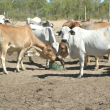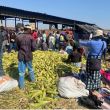 All you need to know about the Plant Quarantine Services Institute (PQSI)
All you need to know about the Plant Quarantine Services Institute (PQSI)
IN a bid to provide farmers with accurate information on emerging pests and diseases, we had a chat with the Head of the Plant Quarantine Services Institute, Research Services Department under the Agricultural Research, Innovation and Specialist Services Directorate, Mrs Louisa Makumbe, who shared invaluable knowledge on the role of the institute including strategies in place manage plant pestsand provide early warning against emerging new ones so as protect Zimbabwe’s plant health and promote safe trade.
MM: What is the role and mandate of the Plant Quarantine Services Institute (PQSI)?
LM: The Plant Quarantine Services Institute is under the Agricultural Research, Innovation and Specialist Services Directorate. Under that directorate we have the Research Services Division and Plant Quarantine Services Institute is one of the seven institutes that falls under the Research Services Division.
As an institute we are mandated to detect, to monitor, as well as give intelligence on emerging pests and diseases as we conduct early warning to manage those pests so that we protect Zimbabwe’s plant health. We also want to protect Zimbabwe’s agriculture and environment as well as promote safe trade in plants and plant products. That is our mandate overall and we do it through many cross-cutting branches within our institution.
The branches within our institution mainly involve operations, diagnostics, surveillance as well as plant import regulation and international liaison. The operations branch is involved in supporting import and export of plant products which involves inspections and issuing of import and export documents. We reciprocally offer phytosanitary certificates in response to import conditions that are given by our trading partners.
Another branch is that of surveillance – which is vigilant in monitoring for pests and diseases that have an impact on Zimbabwe’s plant health. In that regard, we are constantly monitoring for potential pest risks that could affect Zimbabwe’s agriculture and the environment.
The diagnostic section, is a backup section where throughout our surveillance they are the ones mandated to diagnose whatever pests or diseases that are found in the field and give a proper identification. We work with our local universities, academia and international centres of excellence so that we accurately identify pests and make timeous decisions in managing the pests and diseases.
 We also have a section that we call plant import regulation and international liaison which is mandated to ensure that our import conditions are up-to-date so that as we are importing products into Zimbabwe which do not pose a risk to our agriculture. They are also mandated to ensure we meet the conditions of export stipulated by our trading partners.
We also have a section that we call plant import regulation and international liaison which is mandated to ensure that our import conditions are up-to-date so that as we are importing products into Zimbabwe which do not pose a risk to our agriculture. They are also mandated to ensure we meet the conditions of export stipulated by our trading partners.
The institute is decentralized and operations Services are offered at over 40 substations country wide including internally and at exit/ entry points including airports, railway entry/exits of Zimbabwe. The Institute’s head office is found at the Mazowe , Plant Quarantine Station
Plant quarantine staff stationed there are mandated to monitor documents that pertain to plant imports plant importation and exports. They also do routine inspections for other legislative issues that we are mandated to do.
What is a phytosanitary certificate?
A phytosanitary certificate or a plant passport, is a document which accompanies plant products that are being transported into or out of a country. A phytosanitary certificate is guided by import conditions of that country that is importing a product. So, it works hand in hand with a plant import permit.
The Plant Pest and Disease Act Chapter 19.08 is the main act that governs our work but we also have accompanying legislation which regulate the following;
– importation of plant products
– registration of nurseries
– safe production of tobacco, cotton, paprika
– Warehouse Receipt Act and
– the Research Act
As the institute, we are regarded as the National Plant Protection Organization of Zimbabwe and we are signatories to the International Plant Protection Convention under the Food and Agriculture Organization of the United Nations (FA0) which promotes safe trading in plant and plant products.
MM: What issues, pests or diseases are affecting Zimbabwe currently?
LM: As plant quarantine we are mandated to ensure that emerging pests are kept at bay and even if they come into the country that they are localised within the areas of detection. As we continue to carry out our mandate we know that natural spread is inevitable but we will continue to do this fight.
As a country we are constantly exposed to emerging plant pests and diseases because of climate change. Constantly the environment that pests are living in is changing so much that we constantly get new pests that we have to battle with and that we have to monitor, detect and keep at bay before they spread to new areas. Recently you’ve seen the emergence of *Fall Army Worm (FAW)*, and the emergence of Tuta absoluta or tomato leaf miner, which were not there before.
 There are some pests which were indigenous to Zimbabwe and we have to constantly monitor and ensure that as we are trading, we do not trade those pests are not introduced to new areas through our exports. In the citrus sector, we have the False Codling Moth (FCM) (FCM) , Citrus Black Spot (CBS), Ceratitis capitata – a fruit fly which is commonly known as Mediterranean fruit fly. We are fighting all those pests to ensure that we can still trade by creating what we call Pest Free Areas (PFA). Pest Free Areas allow our trading partners to have confidence in us that although we have pests in our areas, we have managed to clean a product and allow it to be exported to our trading partners.
There are some pests which were indigenous to Zimbabwe and we have to constantly monitor and ensure that as we are trading, we do not trade those pests are not introduced to new areas through our exports. In the citrus sector, we have the False Codling Moth (FCM) (FCM) , Citrus Black Spot (CBS), Ceratitis capitata – a fruit fly which is commonly known as Mediterranean fruit fly. We are fighting all those pests to ensure that we can still trade by creating what we call Pest Free Areas (PFA). Pest Free Areas allow our trading partners to have confidence in us that although we have pests in our areas, we have managed to clean a product and allow it to be exported to our trading partners.
However, we also have some pests which we call quarantine pests. I think from COVID people understand what quarantine is. A quarantine pest is a pest that we do not yet have in Zimbabwe and we want it quarantined as we do not want it to enter within the boundaries of Zimbabwe.
Currently as an institute we have over 14 pests that we are constantly doing surveillance for. These range from pests of food security nature. Maize is a staple to us and as we go through drought years where we import grains, we want to ensure that pests that affect our cereals do not come in on the products that we are importing.
We are fighting against a causal agent, a virus called Maize Chlorotic Mottle Virus which leads to a deadly disease called Maize Lethal Necrosis (MLN). As a country we are importing cereal grains from safe zones and avoiding zones where we very much know that Maize Lethal Necrosis is. However, because of lack of awareness, traders may feel like we are fighting them from buying cheap maize from cheaper sources.
As an institute, we are constantly raising awareness to our traders on safe methods for importing key commodities to feed the nation.
We are also fighting pests that affect our other second staple, potato.

Gordon Berg, DPI Victoria, PaDIL.
We are fighting pests such as the Potato Cyst Nematodes as we’re importing seed potato from countries that already have the same problem.
There is also the Pepper Ring Spot Virus (PepRSV) which is,a major threat to Potatoes and we are also fighting to make sure that it does not enter Zimbabwe through trade.
We also have a number of pests that affect tobacco like the Blue Mould disease and we are working tirelessly to do surveillance for psyllids and for diseases like the Hualongbing (HLB) disease in citrus and we are fighting against a spectrum of fruit flies that are not yet in Zimbabwe such as the Bactrocera zonata and latrifrons species,
We advocate for Integrated Pest Management (IPM) strategies where we encourage farmers to integrate chemical , cultural and biological control methods where you use things like Good Agricultural Practices (GAP), natural enemies – the farmer’s friends to fight pests and diseases. It is important to also adopt cultural control to improve hygiene within your farm – pick up rotten fruits, make sure your trees are pruned on time, remove diseased material on time and destroy it adequately.
As an institute we also provide training because without training farmers on all these cross-cutting issues plant health will be adversely impacted.
The institute also collaborates with extension personnel to equip them with information to educate our farmers in terms of plant health. Also, the extension personnel give us feedback on the real issues which farmers are facing in terms of plant health which helps us to conduct research that is informed and relevant.
We also work with the academia and partners such as the FAO, the European Union, SADC and COMESA who collaborate with us through provision of expertise and funding.
MM: WHAT IS THE INSTTITUTE PLANNING IN LINE WITH IMPROVING THE PERMIT MANAGEMENT SYSTEM?
LM: We are on a drive to have an electronic permit management system and to become one of the stakeholders on the Zimbabwe Electronic Single Window which will be key in us managing documentation as well as managing our phytosanitary services online.
The Agricultural Permit Management System becomes an electronic one-stop shop where one is able to make applications for a permit and get all the relevant permits immediately online without them leaving their chairs and replaces the physical one-stop shop that is already existent within our ministry. This will improve the ease of doing business.
MM: What are some of the challenges you face in your work?
LM: Lack of awareness by our partners is one of the major challenges we face.
As humans, we’re attracted to plants as we travel around the globe. Traders tend to get attracted to fruits, plants, flowers but if they do not import them safely, they bring pests and diseases.
As Plant Quarantine Services Institute we are in a constant fight with people who want to bring in something that they love but are unaware of the risks that it brings into the country – without proper inspection and documentation.
We use platforms like the trade fairs, agricultural shows and at ward and district levels to raise awareness.
We are present at district shows and we invite the public to visit us so that they may understand us as an equal partner rather than as a regulator.
Another challenge is access to up-to-date equipment for diagnostics so we are constantly engaging with trading partners for support.
Morden equipment will help us ensure that we do the right diagnostics and advise government timeously to take measures to prevent the entry of pests and diseases.










